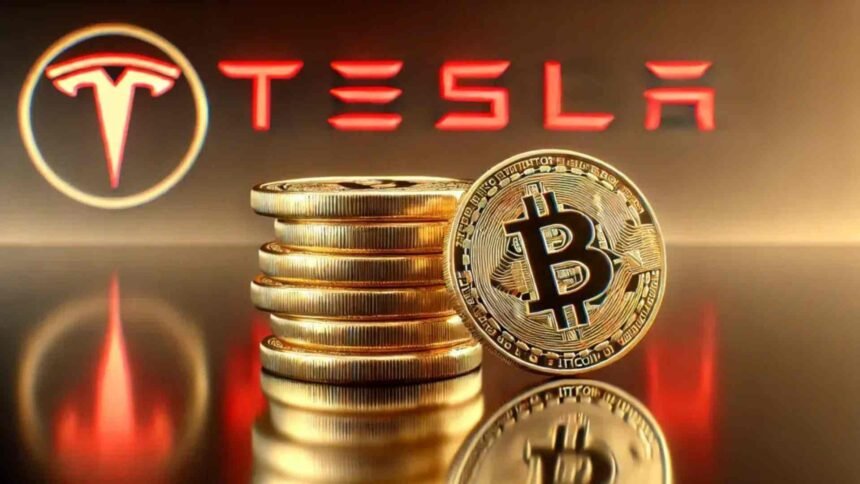Tesla Bitcoin took center stage this week as the electric‑vehicle giant carried out a significant crypto sale, marking a strategic shift in how it manages its digital assets. This move, timed with newly adopted accounting guidance, sent ripples through both the automotive and crypto markets alike.
What Happened?
- Tesla sold a large portion of its Bitcoin holdings, reducing its crypto stake while realizing gains under new Financial Accounting Standards Board (FASB) rules.
- This action unlocked around $600 million in mark‑to‑market gains during Q4 2024, as Tesla revalued its crypto assets at fair market prices rather than historical lows.
- Tesla still retains approximately 11,500 BTC, valued at close to $1 billion, making it one of the largest corporate Bitcoin holders today.
Why the Timing? Accounting + Strategy
1. New FASB Accounting Rules
Tesla early‑adopted updated FASB accounting standards requiring crypto assets to be marked to market each quarter. Previously, unrealized gains couldn’t be recognized a rule that skewed financial visibility. The new standard enabled Tesla to reflect the $600 million gain without an actual sale.
2. Risk Management and Liquidity
While holding Bitcoin offers upside, maintaining liquidity is prudent given market volatility. By trimming its position, Tesla freed up cash while locking in gains, improving balance‑sheet flexibility without a full exit.
3. Environmental and Strategy Considerations
Tesla has historically tread carefully with Bitcoin due to environmental concerns. Though it initially accepted BTC as vehicle payment in 2021, it reversed course amid criticism of Bitcoin mining’s carbon footprint. The company now treats Bitcoin as a treasury asset—not an operational currency.
Tesla Bitcoin Performance Over Time
Market & Investor Reaction
Tesla’s recent Bitcoin activity has sparked a variety of responses across financial markets and investor circles. The company’s stock has been under pressure lately, largely due to weakening electric vehicle sales and growing competition. However, the crypto-related gains reported this quarter have offered a timely boost to Tesla’s financial narrative. Analysts point to Tesla’s ability to unlock $600 million in unrealized crypto profits as the result of a change in accounting rules.
While this strategy demonstrates financial savvy, it also raises lingering concerns about Bitcoin’s notorious price volatility and its impact on corporate balance sheets. From an institutional perspective, Tesla’s move could serve as a case study for other firms. Financial executives and corporate treasurers are watching closely, viewing Tesla’s approach as a possible blueprint for integrating crypto assets into broader treasury strategies without overexposing the company to unnecessary risk.
What It Means for the Crypto Landscape
Tesla’s handling of its Bitcoin holdings adds a layer of legitimacy to the idea of corporate crypto adoption. By utilizing updated accounting rules that allow for fair-value reporting, the company has shown that it’s possible to hold digital assets, reflect gains responsibly, and maintain financial stability. This positions Bitcoin less as a speculative gamble and more as a viable treasury reserve asset—especially for companies with substantial capital. At the same time, the environmental conversation hasn’t faded. Tesla has previously paused Bitcoin-related transactions over concerns about mining sustainability, and critics continue to pressure the company for stronger alignment with clean energy principles.
As such, while Tesla maintains a meaningful presence in the crypto space, any reintroduction of Bitcoin payments or deeper crypto integrations will likely depend on continued progress in sustainable mining practices.Tesla’s handling of its Bitcoin holdings adds a layer of legitimacy to the idea of corporate crypto adoption. By utilizing updated accounting rules that allow for fair-value reporting, the company has shown that it’s possible to hold digital assets, reflect gains responsibly, and maintain financial stability. This positions Bitcoin less as a speculative gamble and more as a viable treasury reserve asset especially for companies with substantial capital.
At the same time, the environmental conversation hasn’t faded. Tesla has previously paused Bitcoin-related transactions over concerns about mining sustainability, and critics continue to pressure the company for stronger alignment with clean energy principles. As such, while Tesla maintains a meaningful presence in the crypto space, any reintroduction of Bitcoin payments or deeper crypto integrations will likely depend on continued progress in sustainable mining practices.
Looking Ahead
- Tesla Bitcoin might be back in focus during the next earnings call does the company reinvest or consider further sales?
- Will Tesla ever accept Bitcoin payments again?
Unclear Elon Musk hinted only if mining becomes mostly renewable, but no official plan is in place.How will other companies follow Tesla’s lead now that FASB rules allow fair valuation? Many may adopt similar accounting strategies to improve visibility into crypto subsidiaries.
Tesla Bitcoin headlines serve as a reminder that corporate crypto strategy is maturing. With its deliberate crypto sale and accounting‑driven gain, Tesla demonstrates a nuanced approach one that blends opportunistic timing with financial hall‑marks of prudence and transparency. While it still holds a billion‑dollar Bitcoin stash, this latest move likely signals a more measured, institutional-style posture toward digital assets setting a blueprint for other public companies navigating crypto’s volatile terrain.
Tesla’s careful recalibration may define the next chapter in Bitcoin’s journey from fringe speculation to board‑room backed reserve asset and wind up being a powerful signal of crypto’s transition into mainstream corporate finance.






